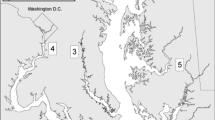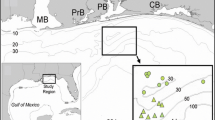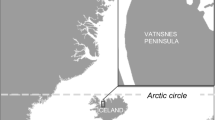Abstract
DNA barcoding is used in a variety of ecological applications to identify organisms, including partially digested prey items from diet samples. That particular application can enhance the ability to characterize diet and predator–prey dynamics but is problematic when genetic sequences of prey match those of consumer species (i.e., self-DNA). Such a result may indicate cannibalism, but false positives can result from contamination of degraded prey samples with consumer DNA. Here, nuclear-encoded microsatellite markers were used to genotype invasive lionfish, Pterois volitans, consumers and their prey (n = 80 pairs) previously barcoded as lionfish. Cannibalism was confirmed when samples exhibited two or more different alleles between lionfish and prey DNA across multiple microsatellite loci. This occurred in 26.2% of all samples and in 42% of samples for which the data were considered conclusive. These estimates should be considered conservative given rigorous assignment criteria and low allelic diversity in invasive lionfish populations. The highest incidence of cannibalism corresponded to larger sized consumers from areas with high lionfish densities, suggesting cannibalism in northern Gulf of Mexico lionfish is size- and density-dependent. Cannibalism has the potential to influence population dynamics of lionfish which lack native western Atlantic predators. These results also have important implications for interpreting DNA barcoding analysis of diet in other predatory species where cannibalism may be underreported.

Similar content being viewed by others
References
Albins MA (2013) Effects of invasive Pacific red lionfish Pterois volitans versus a native predator on Bahamian coral-reef fish communities. Biol Invasions 15:29–43. https://doi.org/10.1007/s10530-012-0266-1
Albins MA (2015) Invasive Pacific lionfish Pterois volitans reduce abundance and species richness of native Bahamian coral-reef fishes. Mar Ecol Prog Ser 522:231–243. https://doi.org/10.3354/meps11159
Albins MA, Hixon MA (2008) Invasive Indo-Pacific lionfish Pterois volitans reduce recruitment of Atlantic coral-reef fishes. Mar Ecol Prog Ser 367:233–238. https://doi.org/10.3354/meps07620
Albins MA, Hixon MA (2013) Worst case scenario: potential long-term effects of invasive predatory lionfish (Pterois volitans) on Atlantic and Caribbean coral-reef communities. Environ Biol Fishes 96:1151–1157. https://doi.org/10.1007/s10641-011-9795-1
Arroyave J, Stiassny MLJ (2014) DNA barcoding reveals novel insights into pterygophagy and prey selection in distichodontid fishes (characiformes: Distichodontidae). Ecol Evol 4:4534–4542. https://doi.org/10.1002/ece3.1321
Babbitt KJ, Meshaka WE (2000) Benefits of eating conspecifics: effects of background diet on survival and metamorphosis in the Cuban treefrog (Osteopilus septentrionalis). Copeia 2000:469–474. https://doi.org/10.1643/0045-8511(2000)000[0469:BOECEO]2.0.CO;2
Bailey HK, Cowan JH, Shipp RL (2001) Experimental evaluation of potential effects of habitat size and presence of conspecifics on habitat association by young-of-the-year red snapper. Gulf Mex Sci 19:119–131
Barbour AB, Montgomery ML, Adamson AA et al (2010) Mangrove use by the invasive lionfish Pterois volitans. Mar Ecol Prog Ser 401:291–294. https://doi.org/10.3354/meps08373
Bartley T, Mccann KS, Bartley TJ et al (2015) DNA barcoding increases resolution and changes structure in Canadian boreal shield lake food webs. DNA Barcodes 3:30–43. https://doi.org/10.1515/dna-2015-0005
Benkwitt CE, Albins MA, Buch KL et al (2017) Is the lionfish invasion waning? Evidence from The Bahamas. Coral Reefs 36:1255–1261
Biggs CR, Olden JD (2011) Multi-scale habitat occupancy of invasive lionfish (Pterois volitans) in coral reef environments of Roatan, Honduras. Aquat Invasions 6:347–353. https://doi.org/10.3391/ai.2011.6.3.11
Bradley BJ, Vigilant L (2002) False alleles derived from microbial DNA pose a potential source of error in microsatellite genotyping of DNA from faeces. Mol Ecol Notes 2:602–605. https://doi.org/10.1046/j.1471-8286.2002.00302.x
Braid HE, Deeds J, DeGrasse SL et al (2012) Preying on commercial fisheries and accumulating paralytic shellfish toxins: a dietary analysis of invasive Dosidicus gigas (Cephalopoda Ommastrephidae) stranded in Pacific Canada. Mar Biol 159:25–31. https://doi.org/10.1007/s00227-011-1786-4
Broquet T, Ménard N, Petit E (2007) Noninvasive population genetics: a review of sample source, diet, fragment length and microsatellite motif effects on amplification success and genotyping error rates. Conserv Genet 8:249–260
Chistiakov DA, Hellemans B, Volckaert FAM (2006) Microsatellites and their genomic distribution, evolution, function and applications: a review with special reference to fish genetics. Aquaculture 255:1–29
Claessen D, de Roos AM, Persson L (2004) Population dynamic theory of size-dependent cannibalism. Proc R Soc B Biol Sci 271:333–340. https://doi.org/10.1098/rspb.2003.2555
Claydon J, Calosso M, Traiger S (2012) Progression of invasive lionfish in seagrass, mangrove and reef habitats. Mar Ecol Prog Ser 448:119–129. https://doi.org/10.3354/meps09534
Côté IM, Green SJ, Morris JA et al (2013) Diet richness of invasive Indo-Pacific lionfish revealed by DNA barcoding. Mar Ecol Prog Ser 472:249–256. https://doi.org/10.3354/meps09992
Dahl KA, Patterson WF (2014) Habitat-specific density and diet of rapidly expanding invasive red lionfish, Pterois volitans, populations in the northern Gulf of Mexico. PLoS ONE 9:e105852. https://doi.org/10.1371/journal.pone.0105852
Dahl KA, Patterson WF, Snyder RA (2016) Experimental assessment of lionfish removals to mitigate reef fish community shifts on northern Gulf of Mexico artificial reefs. Mar Ecol Prog Ser 558:207–221. https://doi.org/10.3354/meps11898
Dahl KA, Patterson WF, Robertson A, Ortmann AC (2017) DNA barcoding significantly improves resolution of invasive lionfish diet in the northern Gulf of Mexico. Biol Invasions 19:1917–1933. https://doi.org/10.1007/s10530-017-1407-3
Darling ES, Green SJ, O’Leary JK, Côté IM (2011) Indo-Pacific lionfish are larger and more abundant on invaded reefs: a comparison of Kenyan and Bahamian lionfish populations. Biol Invasions 13:2045–2051. https://doi.org/10.1007/s10530-011-0020-0
De Barba M, Miquel C, Boyer F et al (2014) DNA metabarcoding multiplexing and validation of data accuracy for diet assessment: application to omnivorous diet. Mol Ecol Resour 14:306–323. https://doi.org/10.1111/1755-0998.12188
DeWoody JA, Fletcher DE, Wilkins SD, Avise JC (2001) Genetic documentation of filial cannibalism in nature. Proc Natl Acad Sci USA 98:5090–5092. https://doi.org/10.1073/pnas.091102598
Diller JL, Frazer TK, Jacoby CA (2014) Coping with the lionfish invasion: evidence that naïve, native predators can learn to help. J Exp Mar Biol Ecol 455:45–49. https://doi.org/10.1016/j.jembe.2014.02.014
Frézal L, Leblois R (2008) Four years of DNA barcoding: current advances and prospects. Infect Genet Evol 8:727–736. https://doi.org/10.1016/j.meegid.2008.05.005
Fugi R, Luz-Agostinho KDG, Agostinho AA (2008) Trophic interaction between an introduced (peacock bass) and a native (dogfish) piscivorous fish in a neotropical impounded river. Hydrobiologia 607:143–150. https://doi.org/10.1007/s10750-008-9384-2
Gagneux P, Boesch C, Woodruff DS (1997) Microsatellite scoring errors associated with noninvasive genotyping based on nuclear DNA amplified from shed hair. Mol Ecol 6:861–868. https://doi.org/10.1111/j.1365-294X.1997.tb00140.x
Gomiero LM, Braga FMS (2004) Cannibalism as the main feeding behaviour of tucunares introduced in southeast Brazil. Braz J Biol 64:625–632. https://doi.org/10.1590/S1519-69842004000400009
Gonzalez JM, Portillo MC, Belda-Ferre P, Mira A (2012) Amplification by PCR artificially reduces the proportion of the rare biosphere in microbial communities. PLoS ONE 7:e29973. https://doi.org/10.1371/journal.pone.0029973
Goossens B, Waits LP, Taberlet P (1998) Plucked hair samples as a source of DNA: reliability of dinucleotide microsatellite genotyping. Mol Ecol 7:1237–1241. https://doi.org/10.1046/j.1365-294x.1998.00407.x
Green SJ, Côté IM (2009) Record densities of Indo-Pacific lionfish on Bahamian coral reefs. Coral Reefs 28:107. https://doi.org/10.1007/s00338-008-0446-8
Hackerott S, Valdivia A, Green SJ et al (2013) Native predators do not influence invasion success of Pacific lionfish on Caribbean reefs. PLoS ONE 8:e68259. https://doi.org/10.1371/journal.pone.0068259
Harwood JD, Phillips SW, Sunderland KD, Symondson WOC (2001) Secondary predation: quantification of food chain errors in an aphid-spider-carabid system using monoclonal antibodies. Mol Ecol 10:2049–2057. https://doi.org/10.1046/j.0962-1083.2001.01349.x
Hebert PDN, Cywinska A, Ball SL, deWaard JR (2003) Biological identifications through DNA barcodes. Proc R Soc B Biol Sci 270:313–321. https://doi.org/10.1098/rspb.2002.2218
Hebert PDN, Gregory TR, Savolainen V (2005) The promise of DNA barcoding for taxonomy. Syst Biol 54:852–859. https://doi.org/10.1080/10635150500354886
Hoffman JI, Amos W (2005) Microsatellite genotyping errors: Detection approaches, common sources and consequences for paternal exclusion. Mol Ecol 14:599–612. https://doi.org/10.1111/j.1365-294X.2004.02419.x
Ingeman KE (2016) Lionfish cause increased mortality rates and drive local extirpation of native prey. Mar Ecol Prog Ser 558:235–245. https://doi.org/10.3354/meps11821
Ivanova NV, Zemlak TS, Hanner RH, Hebert PDN (2007) Universal primer cocktails for fish DNA barcoding. Mol Ecol Notes 7:544–548. https://doi.org/10.1111/j.1471-8286.2007.01748.x
Jo H, Gim JA, Jeong KS et al (2014) Application of DNA barcoding for identification of freshwater carnivorous fish diets: is number of prey items dependent on size class for Micropterus salmoides? Ecol Evol 4:219–229. https://doi.org/10.1002/ece3.921
Johnson J, Bird CE, Johnston MA et al (2016) Regional genetic structure and genetic founder effects in the invasive lionfish: comparing the Gulf of Mexico, Caribbean and North Atlantic. Mar Biol 163:216. https://doi.org/10.1007/s00227-016-2981-0
Juanes F (2003) The allometry of cannibalism in piscivorous fishes. Can J Fish Aquat Sci 60:594–602. https://doi.org/10.1139/f03-051
Kimball ME, Miller JM, Whitfield PE, Hare JA (2004) Thermal tolerance and potential distribution of invasive lionfish (Pterois volitans/miles complex) on the east coast of the United States. Mar Ecol Prog Ser 283:269–278. https://doi.org/10.3354/meps283269
Kimura M, Crow JF (1964) The number of alleles that can be maintained in a finite population. Genetics 49:725–738. https://doi.org/10.1016/0040-5809(71)90033-5
Kulbicki M, Beets J, Chabanet P et al (2012) Distributions of Indo-Pacific lionfishes Pterois spp. in their native ranges: implications for the Atlantic invasion. Mar Ecol Prog Ser 446:189–205. https://doi.org/10.3354/meps09442
Kvitrud MA, Riemer SD, Brown RF et al (2005) Pacific harbor seals (Phoca vitulina) and salmon: genetics presents hard numbers for elucidating predator–prey dynamics. Mar Biol 147:1459–1466. https://doi.org/10.1007/s00227-005-0047-9
Lesser MP, Slattery M (2011) Phase shift to algal dominated communities at mesophotic depths associated with lionfish (Pterois volitans) invasion on a Bahamian coral reef. Biol Invasions 13:1855–1868. https://doi.org/10.1007/s10530-011-0005-z
Meirmans PG, Van Tienderen PH (2004) GENOTYPE and GENODIVE: two programs for the analysis of genetic diversity of asexual organisms. Mol Ecol Notes 4:792–794. https://doi.org/10.1111/j.1471-8286.2004.00770.x
Moran Z, Orth DJ, Schmitt JD et al (2015) Effectiveness of DNA barcoding for identifying piscine prey items in stomach contents of piscivorous catfishes. Environ Biol Fishes 99:161–167. https://doi.org/10.1007/s10641-015-0448-7
Morris JA, Akins JL (2009) Feeding ecology of invasive lionfish (Pterois volitans) in the Bahamian archipelago. Environ Biol Fishes 86:389–398. https://doi.org/10.1007/s10641-009-9538-8
Morte S, Redon MJ, Sanz-Brau A (2001) Diet of Scorpaena porcus and Scorpaena notata (Pisces: Scorpaenidae) in the western Mediterranean. Cah Biol Mar 42:333–344
Muñoz RC, Currin CA, Whitfield PE (2011) Diet of invasive lionfish on hard bottom reefs of the southeast USA: insights from stomach contents and stable isotopes. Mar Ecol Prog Ser 432:181–193. https://doi.org/10.3354/meps09154
Nei M (1987) Molecular evolutionary genetics. Columbia University Press, New York
O’Rorke R, Lavery S, Chow S et al (2012) Determining the diet of larvae of western rock lobster (Panulirus cygnus) using high-throughput DNA sequencing techniques. PLoS ONE 7:e42757. https://doi.org/10.1371/journal.pone.0042757
Oliveira ML, Duarte JMB (2013) Amplifiability of mitochondrial, microsatellite and amelogenin DNA loci from fecal samples of red brocket deer Mazama americana (Cetartiodactyla, Cervidae). Genet Mol Res 12:44–52. https://doi.org/10.4238/2013.January.16.8
Pereira LS, Agostinho AA, Winemiller KO (2017) Revisiting cannibalism in fishes. Rev Fish Biol Fish 27:499–513. https://doi.org/10.1007/s11160-017-9469-y
Persson L, Byström P, Wahlström E (2000) Cannibalism and competition in Eurasian perch: population dynamics of an ontogenetic omnivore. Ecology 81:1058–1071. https://doi.org/10.1890/0012-9658(2000)081[1058:CACIEP]2.0.CO;2
Polis GA (1981) The evolution and dynamics of intraspecific predation. Annu Rev Ecol Syst 12:225–251. https://doi.org/10.1146/annurev.es.12.110181.001301
Pusack TJ, Benkwitt CE, Cure K, Kindinger TL (2016) Invasive red lionfish (Pterois volitans) grow faster in the Atlantic Ocean than in their native Pacific range. Environ Biol Fishes 99:571–579. https://doi.org/10.1007/s10641-016-0499-4
Renshaw MA, Giresi M, Adams JO (2013) Microsatellite fragment analysis using the ABI Prism® 377 DNA sequencer. Methods Mol Biol 1006:181–196. https://doi.org/10.1007/978-1-62703-389-3-13
Ricardo BR, Hines A, Arturo AP et al (2011) Reconstructing the lionfish invasion: insights into Greater Caribbean biogeography. J Biogeogr 38:1281–1293. https://doi.org/10.1111/j.1365-2699.2011.02496.x
Ricker WE (1954) Stock and recruitment. J Fish Res Board Can 11:559–623. https://doi.org/10.1139/f54-039
Rudolf VHW (2008) Impact of cannibalism on predator prey dynamics: size-structured interactions and apparent mutualism. Ecology 89:1650–1660. https://doi.org/10.1890/07-0709.1
Schneider PM, Bender K, Mayr WR et al (2004) STR analysis of artificially degraded DNA—results of a collaborative European exercise. Forensic Sci Int 139:123–134. https://doi.org/10.1016/j.forsciint.2003.10.002
Schofield PJ (2010) Update on geographic spread of invasive lionfishes (Pterois volitans [Linnaeus, 1758] and P. miles [Bennett, 1828]) in the western north Atlantic Ocean, Caribbean Sea and Gulf of Mexico. Aquat Invasions 5:S117–S122. https://doi.org/10.3391/ai.2010.5.S1.024
Schultz TF, Fitzpatrick CK, Wilson Freshwater D, Morris JA (2013) Characterization of 18 polymorphic microsatellite loci from invasive lionfish (Pterois volitans and P. miles). Conserv Genet Resour 5:599–601. https://doi.org/10.1007/s12686-013-9860-5
Shaw PW, Pierce GJ, Boyle PR (1999) Subtle population structuring within a highly vagile marine invertebrate, the veined squid Loligo forbesi, demonstrated with microsatellite DNA markers. Mol Ecol 8:407–417. https://doi.org/10.1046/j.1365-294X.1999.00588.x
Sheppard SK, Harwood JD (2005) Advances in molecular ecology: tracking trophic links through predator–prey food-webs. Funct Ecol 19:751–762
Sikkel PC, Tuttle LJ, Cure K et al (2014) Low susceptibility of invasive red lionfish (Pterois volitans) to a generalist ectoparasite in both its introduced and native ranges. PLoS ONE 9:e95854. https://doi.org/10.1371/journal.pone.0095854
Smith C, Reay P (1991) Cannibalism in teleost fish. Rev Fish Biol Fish 1:41–64
Soulsbury CD, Iossa G, Edwards KJ et al (2007) Allelic dropout from a high-quality DNA source. Conserv Genet 8:733–738. https://doi.org/10.1007/s10592-006-9194-x
Sousa LL, Xavier R, Costa V et al (2016) DNA barcoding identifies a cosmopolitan diet in the ocean sunfish. Sci Rep 6:28762. https://doi.org/10.1038/srep28762
Stevens PW, Fox SL, Montague CL (2006) The interplay between mangroves and saltmarshes at the transition between temperate and subtropical climate in Florida. Wetl Ecol Manag 14:435–444. https://doi.org/10.1007/s11273-006-0006-3
Sundqvist AK, Ellegren H, Vilà C (2008) Wolf or dog? Genetic identification of predators from saliva collected around bite wounds on prey. Conserv Genet 9:1275–1279. https://doi.org/10.1007/s10592-007-9454-4
Symondson WOC (2002) Molecular identification of prey in predator diets. Mol Ecol 11:627–641
Taberlet P, Griffin S, Goossens B et al (1996) Reliable genotyping of samples with very low DNA quantities using PCR. Nucl Acids Res 24:3189–3194. https://doi.org/10.1093/nar/24.16.3189
Tanaka M, Goto T, Tomiyama M, Sudo H (1989) Immigration, settlement and mortality of flounder (Paralichthys olivaceus) larvae and juveniles in a nursery ground, Shijiki bay, Japan. Neth J Sea Res 24:57–67. https://doi.org/10.1016/0077-7579(89)90170-1
Teletchea F, Bernillon J, Duffraisse M et al (2008) Molecular identification of vertebrate species by oligonucleotide microarray in food and forensic samples. J Appl Ecol 45:967–975. https://doi.org/10.1111/j.1365-2664.2007.01415.x
Toledo-Hernández C, Vélez-Zuazo X, Ruiz-Diaz CP et al (2014) Population ecology and genetics of the invasive lionfish in Puerto Rico. Aquat Invasions 9:227–237. https://doi.org/10.3391/ai.2014.9.2.12
Tuttle LJ, Sikkel PC, Cure K, Hixon MA (2017) Parasite-mediated enemy release and low biotic resistance may facilitate invasion of Atlantic coral reefs by Pacific red lionfish (Pterois volitans). Biol Invasions 19:563–575. https://doi.org/10.1007/s10530-016-1342-8
Valdez-Moreno M, Quintal-Lizama C, Gómez-Lozano R, del Carmen García-Rivas M (2012) Monitoring an alien invasion: DNA barcoding and the identification of lionfish and their prey on coral reefs of the Mexican Caribbean. PLoS ONE 7:e36636. https://doi.org/10.1371/journal.pone.0036636
Valentini A, Pompanon F, Taberlet P (2009) DNA barcoding for ecologists. Trends Ecol Evol 24:110–117
Van Oosterhout C, Hutchinson WF, Wills DPM, Shipley P (2004) MICRO-CHECKER: software for identifying and correcting genotyping errors in microsatellite data. Mol Ecol Notes 4:535–538. https://doi.org/10.1111/j.1471-8286.2004.00684.x
Vestheim H, Jarman SN (2008) Blocking primers to enhance PCR amplification of rare sequences in mixed samples—a case study on prey DNA in Antarctic krill stomachs. Front Zool 5:12. https://doi.org/10.1186/1742-9994-5-12
Villaseñor-Derbez JC, Herrera-Pérez R (2014) Brief description of prey selectivity and ontogenetic changes in the diet of the invasive lionfish Pterois volitans (Actinopterygii, Scorpaenidae) in the Mexican Caribbean. Panam J Aquat Sci 9:131–135
Ward RD, Zemlak TS, Innes BH et al (2005) DNA barcoding Australia’s fish species. Philos Trans R Soc B Biol Sci 360:1847–1857. https://doi.org/10.1098/rstb.2005.1716
Ward RD, Hanner R, Hebert PDN (2009) The campaign to DNA barcode all fishes, FISH-BOL. J Fish Biol 74:329–356
Acknowledgements
We thank Amanda Barker, Pavel Dimens, Shannon O’Leary, Dannielle Kulaw, Dominic Swift, Elizabeth Hunt, and Stuart Willis for assistance in the Marine Genomics Lab at TAMU-CC during this study. We thank Dalton Kennedy, Scott Bartel, Clint Retherford, Bryan Clark, Andy Ross, Anna Clark, Jeremy Porter, Michael Day and Kylie Gray for assistance acquiring lionfish samples for this study. We thank Joseph Tarnecki, Brian Klimek, Justin Lewis, Steve Garner, and Michael Norberg for assistance with the processing of whole lionfish. This research was made possible by a grant from The Gulf of Mexico Research Initiative/C-IMAGE II. Data are publicly available through the Gulf of Mexico Research Initiative Information & Data Cooperative (GRIIDC) at https://data.gulfresearchinitiative.org (doi: 10.7266/N7F769ZD). This research was also made possible by a grant from Mississippi Alabama SeaGrant (USM-GR03924-R-HCE-04-PD).
Author information
Authors and Affiliations
Corresponding author
Rights and permissions
About this article
Cite this article
Dahl, K.A., Portnoy, D.S., Hogan, J.D. et al. Genotyping confirms significant cannibalism in northern Gulf of Mexico invasive red lionfish, Pterois volitans. Biol Invasions 20, 3513–3526 (2018). https://doi.org/10.1007/s10530-018-1791-3
Received:
Accepted:
Published:
Issue Date:
DOI: https://doi.org/10.1007/s10530-018-1791-3




